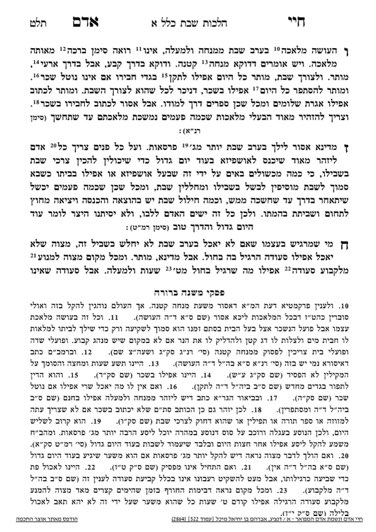We are beginning siman 6. The Chayei Adam will discuss working on Erev Shabbos, based on a Gemara in Pesachim.
The Chayei Adam writes that part of the idea of kavod Shabbos is not to run into Shabbos at the last moment. When possible, a person should give themselves a space of time in which they are winding down and getting ready for Shabbos. Furthermore, Chazal understood that being involved with work on erev Shabbos, that is not related to Shabbos ,after the zman (defined below), one will not have bracha, meaning that the benefit of that work will be wiped out in some way. This is known as aino ro’eh siman bracha.
The Mishnah Berurah points out that this halacha does not apply to working for someone else, where the employer requires the employee to work until late. An employee’s time is given over to their boss, so it is out of the hands of the employee. However, a person who is self-employed should set up their day in a way that they do not run into Shabbos.
It is important to note that the language of the Chayei Adam does not indicate that it is assur to work after the zman, just that one will not receive bracha. However, the Biur Halacha, in siman 251, points out that when the Rambam codifies this halacha, he writes that Chazal imposed an issur to work after the zman. Therefore, a person who is their own boss must set up their schedule in a way that they do not work after this time.
Regarding the zman, the Chayei Adam writes that one should cease working from the zman of mincha ketana. However, he adds that some hold one should cease working from the zman of mincha gedolah. The concept of sha’os zemanios is that we take the day (sunrise-sunset) and divide it into 12 equal parts. Each of those parts is known as a sha’ah zemanis. For example, in the summer, if sunrise is at 6 am and sunset is at 9 pm, there will be around 15 hours of daylight. Each sha’ah zemanis will be 1:15 long. The zman for mincha gedolah is 6.5 hours into the day; i.e., shortly after midday. In our example, midday would be at 1:30, and a half hour later would be 2:07. Mincha ketana is 9.5 hours into the day and only 2.5 hours before the end of the day. In our example, if sunset is at 9 pm, mincha ketana will be a little before 6 pm.
Thus, from the time of mincha ketana, a person should refrain from doing any melacha, and they do not gain any benefit from the melacha. Even if they gain benefit on that day, they will lose it elsewhere.
The Chayei Adam next discusses the types of melachos involved in this halacha. The Mishnah Berurah discusses one who does not perform physical labor but engages in commerce, buying and selling items. This is known in halacha as engaging in prakmatia. The Mishnah Berurah writes that the minhag is to be more lenient regarding prakmatia, and even more lenient regarding prakmatia needed for Shabbos.
The Chayei Adam adds that the warning of Chazal that a person will not gain bracha from work performed after the zman mincha only applies to one who engages in work on a regular basis after the zman mincha. If it happens to a person on a one-off basis, it is not a problem. The language the Chayei Adam uses to distinguish between one who works regularly after the zman mincha and one who does not is ara’i and keva. There are other explanations to understand the difference between these terms, but the above is one of the acceptable explanations.
It comes out that if a person needs to perform melacha on a one-off basis on erev Shabbos after the zman of mincha ketana, it is fine and they do not need to be concerned that they will not see bracha from the melacha.
Summary
One who engages in melacha from after the zman of mincha ketana on erev Shabbos on a regular basis will not gain from their melacha (aino ro’eh siman bracha). If it only occurs on a one-off basis they do not need to be concerned. If they are engaged in prakmatia, there is more room to be lenient, and certainly if they are engaged in prakmatia for the purpose of Shabbos.



